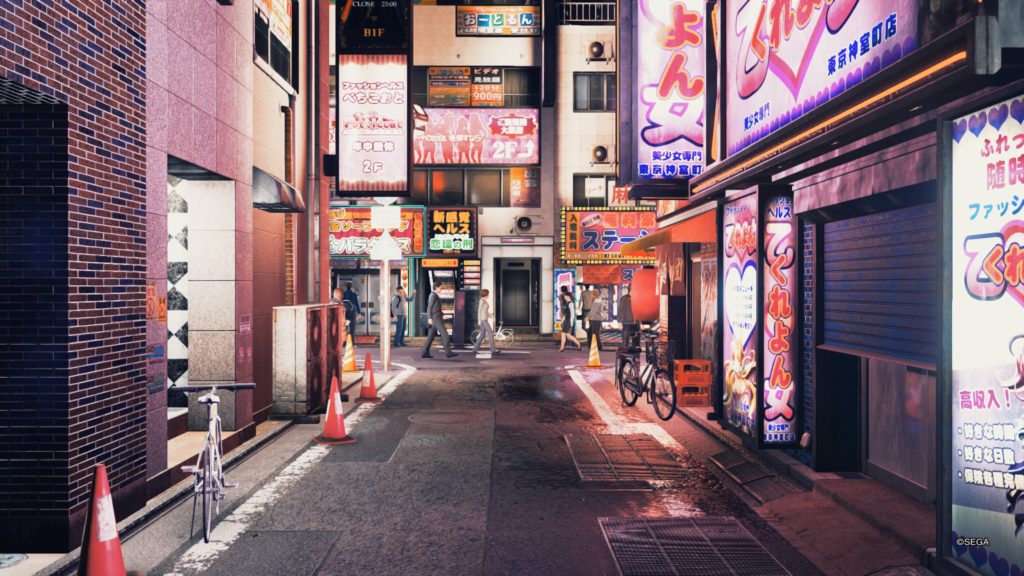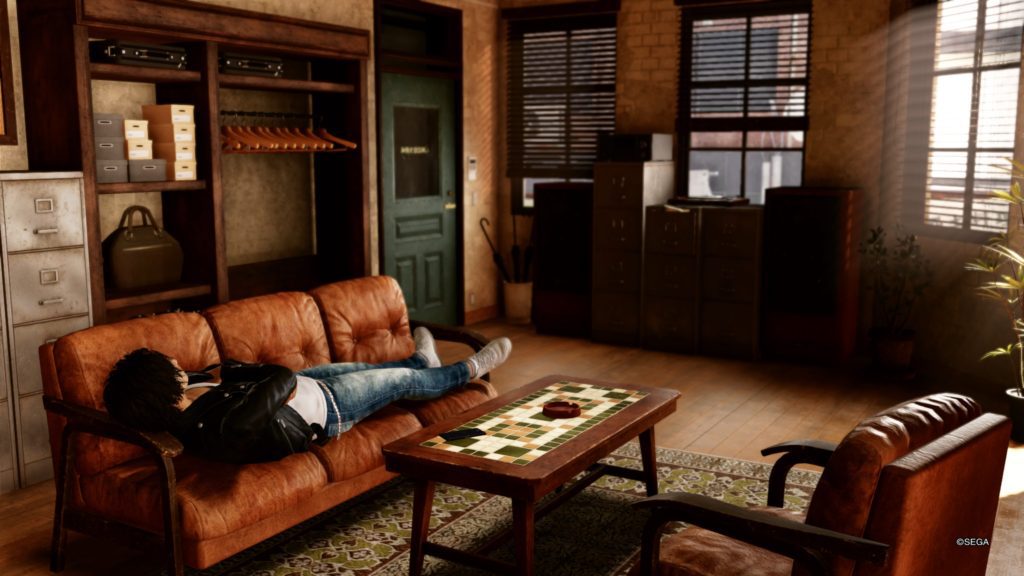Image Credits: Anton Pavlov
Incurable and inevitable, Tokyo’s dark heart continues to beat, glamour and violence intertwined as avenues of glossy neon splinter away into bloody backstreets. In the time since the region’s nightlife revolved around the golden Maharaja and the Millennium Tower was little more than a vacant patch of gravel, Kamurocho hasn’t wavered. Behind every velvet curtain, the sinister puppeteers plot and scheme, with the area serving as both the target and the backdrop for the ill-intended aspirations of the corrupt. The Dragon of Dojima may be gone, but Kamurocho remains as dangerous as it ever was.
Rather than relying on the typically bombastic spectacle of traditional Yakuza games, Judgment reduces the scale of the experience to something more uniquely approachable. Here, the politics and posturing of the yakuza clans represents only a single aspect of its narrative, with the murder mystery at the game’s core an ensemble affair orchestrated by figures from all corners of Kamurocho’s seedy underbelly. Judgment hems together the worst of those clamouring for power, and in that, the depth of the series’ villainy becomes the basis for a captivating pursuit of the truth. As Takayuki Yagami, a lawyer turned private detective, the well-worn streets of Kamurocho are scrutinised down to every last crack in the pavement. And through the lens of an investigator, you’ll be spending an ample amount of time wading through the grime.
Judgment commits a lot of itself to its detective toolkit, ensuring that Yagami’s professional skillset is as frequently utilised as his spin-kicks and palm strikes. It helps that our protagonist is well-versed in the art of self-defence, but as common as conflict is in Kamurocho, Yagami can’t quite achieve the same level of supernatural stopping power as his predecessor, Kiryu. Instead, Judgment heaps emphasis on supplementing emergent street brawls with espionage, Yagami far more apprehensive when faced with a dozen yakuza clansmen all foaming at the mouth. Next to lock-picking, photo opportunities, drone surveillance and chase sequences, Judgment offers plenty when it comes to differentiating itself from its roots in the Yakuza series. And there’s a lot of confidence placed in the game’s detective mechanics too, their implementation integral to the game’s pacing rather than being mere bookends to the action. There’s nothing too difficult to overcome in the line of duty, but the simplicity of such systems means that they can often seem rather menial. Tailing a target is more of an exercise in patience than anything else, with few avenues for failure. While the pursuit of a fleeing suspect can quickly become irksome with its abundance of QTE prompts, all of which play out the same. Separated from the livelier demands of the job, Judgment’s more grounded investigative aspects highlight a better application of its themes. Taking apart crime scenes piece by piece is enjoyable in its meticulousness. And it’s made all the more interesting knowing that you’re going to be called upon to reach a decision based on your interpretation of events. You will always be steered in the right direction eventually, but steadily building a complete case file and unearthing a motive leads to some satisfying conclusions, all delivered with Yagami’s customary self-confidence.
Dissonance isn’t a foreign concept within the Yakuza series, but in Judgment, it casts a far more prominent shadow on proceedings. As its characters are portrayed with a deeper seriousness and the darker tone less forthcoming with breaks of levity, often the world seems at odds with the story that the game is trying to convey. At least in the case of the Yakuza games, the cast mesh with the surrounding world in such a way that even the more outlandish elements seem decidedly at ease. In Judgment, where a courtroom dissection rather than a back alley brawl will ultimately direct the narrative, this coexistence brings with it a noticeable friction. Even so, the game’s greatest strength in spite of this is the story that it tells. A governmental conspiracy brings to the fore the exploits of a masked murderer, with Kamurocho native Yagami tasked with untangling a web of corruption, deceit and betrayal.
YOUR EXPERTISE ISN’T JUST NEEDED IN THE STORY—KAMUROCHO IS FULL OF ADDITIONAL CASES REQUIRING A DETECTIVE’S NOUS.
From its early goings to its climactic conclusion, Judgment’s tale is consistently entertaining and wonderfully unpredictable. And much of what makes the story so interesting rests in the characters that serve as Yagami’s confidants. Complimenting our protagonist’s own unshakeable demeanour is the gruff resilience of his assistant Kaito, the enthusiasm of the streetwise Sugiura, and the uncouth slyness of the informant, Ayabe. When compared to the likes of Kiryu, Yagami cuts a more diminutive presence, but his character is much better suited to the more collaborative story structure. As the lengthy narrative gives plenty of time for key character elements and story beats to simmer, Yagami’s growth as a protagonist is both conclusive and organic. Separated from the isolationism that usually clings to Kamurocho’s chosen knight errant, Judgment’s lead is much more comfortable in his role as a man of the people.
Typically, the lights and sounds of Kamurocho bring with them a glut of side content that regularly puts the pursuit of the truth on the back burner. In Judgment, the wealth of the city’s distractions are condensed into a mobile app on Yagami’s phone called ‘KamuroGo’, with a brief scan telling you everything you need to know about what’s out there awaiting you. Completing challenges through KamuroGo, be they milestones in gorging yourself on steak or home runs struck at the batting cages, all award ‘SP’ which can then be cashed in for new skills and abilities. Once more, classic SEGA arcade titles are represented with the likes of Virtua Fighter 5 and Fighting Vipers, while several traditional Japanese staples return in the form of Mahjong, Shogi and Koi-Koi. Although there’s no larger side-quest arc in the vein of the Clan Creator, Cabaret Club or Real Estate Royale features of past games, side-quests, along with the new ‘Friend Event’ system, are each memorable glimpses into the lives of Kamurocho’s many disaffected.
Making friends around town is particularly enjoyable, not least because every new friend can make a worthy ally for a budding detective. Once you’ve aided some of the locale’s weird and wonderful inhabitants, they’ll greet you on the street, offer you rare items, and even be willing to lend you a hand when it comes to fending off gangs of thugs. Judgment puts a lot of stock in its scaled-back depiction of Kamurocho, shining the spotlight foremost on the many faces that inhabit it. While a smaller compliment of characters may seem like a detriment to its scope, the game’s setting greatly benefits from hosting a simpler narrative with a clearer vision for the protagonist’s place within it. People flock to Yagami for assistance, and in turn, they become regular guests in his day-to-day life. Every act of kindness helps foster a growing community, and with that, Judgment shows that Kamurocho is capable of being much more than just a fighting pit.
As a complete package, Judgment represents a tighter, leaner and more succinct interpretation of the familiar Ryu Ga Gotoku experience. While the introduction of the detective mechanic and its ensuing systems is what differentiates Judgment on the surface, it’s the deeper changes that best characterise the game a solid standalone experience. Judgment’s prevailing tone is portrayed meaningfully and with great confidence, steeping its story in a rich authenticity. While many improvements to existing outlets such as character building and city navigation help broaden the game’s appeal that little bit more. With its imperfections largely stemming from the application of Yagami’s investigative utility, Judgment falls short when it comes to its focus on replication, with many of its systems plainly lacking in imagination and depth. Its portrayal of life on the right side of the law is instead best characterised by its plot, with the story of Judgment brimming with the same vigour and intensity as anything bearing the Yakuza name. Grounded by a sombre tone but propelled by its captivating mystery, Judgment ultimately sacrifices the technical for the practical, and does so with the expected level of flair.

